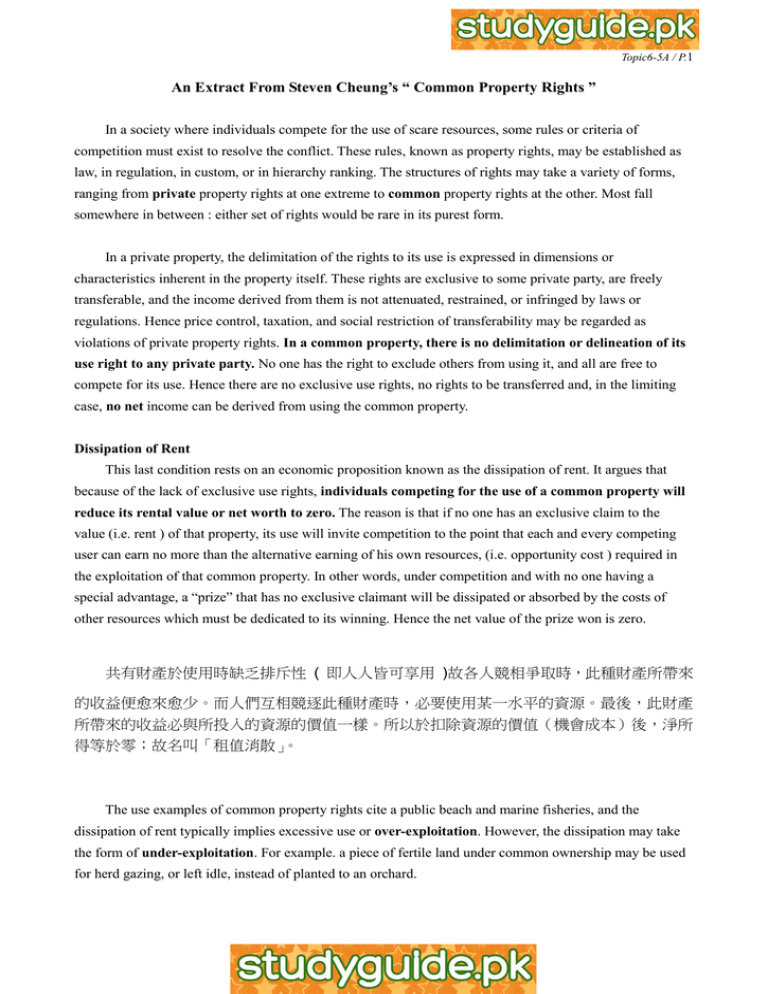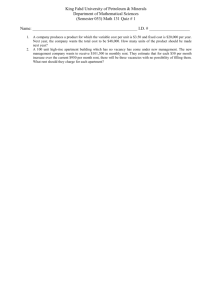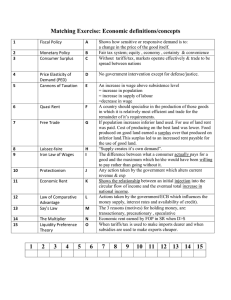An Extract From Steven Cheung’s “ Common Property Rights ”
advertisement

Topic6-5A / P.1 An Extract From Steven Cheung’s “ Common Property Rights ” In a society where individuals compete for the use of scare resources, some rules or criteria of competition must exist to resolve the conflict. These rules, known as property rights, may be established as law, in regulation, in custom, or in hierarchy ranking. The structures of rights may take a variety of forms, ranging from private property rights at one extreme to common property rights at the other. Most fall somewhere in between : either set of rights would be rare in its purest form. In a private property, the delimitation of the rights to its use is expressed in dimensions or characteristics inherent in the property itself. These rights are exclusive to some private party, are freely transferable, and the income derived from them is not attenuated, restrained, or infringed by laws or regulations. Hence price control, taxation, and social restriction of transferability may be regarded as violations of private property rights. In a common property, there is no delimitation or delineation of its use right to any private party. No one has the right to exclude others from using it, and all are free to compete for its use. Hence there are no exclusive use rights, no rights to be transferred and, in the limiting case, no net income can be derived from using the common property. Dissipation of Rent This last condition rests on an economic proposition known as the dissipation of rent. It argues that because of the lack of exclusive use rights, individuals competing for the use of a common property will reduce its rental value or net worth to zero. The reason is that if no one has an exclusive claim to the value (i.e. rent ) of that property, its use will invite competition to the point that each and every competing user can earn no more than the alternative earning of his own resources, (i.e. opportunity cost ) required in the exploitation of that common property. In other words, under competition and with no one having a special advantage, a “prize” that has no exclusive claimant will be dissipated or absorbed by the costs of other resources which must be dedicated to its winning. Hence the net value of the prize won is zero. 共有財產於使用時缺乏排斥性 ( 即人人皆可享用 )故各人競相爭取時,此種財產所帶來 的收益便愈來愈少。而人們互相競逐此種財產時,必要使用某一水平的資源。最後,此財產 所帶來的收益必與所投入的資源的價值一樣。所以於扣除資源的價值(機會成本)後,淨所 得等於零;故名叫「租值消散」。 The use examples of common property rights cite a public beach and marine fisheries, and the dissipation of rent typically implies excessive use or over-exploitation. However, the dissipation may take the form of under-exploitation. For example. a piece of fertile land under common ownership may be used for herd gazing, or left idle, instead of planted to an orchard. Topic6-5A / P.2 In the real world, the complete dissipation of rent is rare indeed. This is because the supply curve of labour or of other inputs my be rising ( some intra-marginal rent may be captured ), the competing users may have different opportunity costs ( the non-marginal users may be enjoying rent ), or entry may be restricted by regulations, by customs, or by information costs. Still, with common property rights some dissipation of rent is inevitable, and no society can afford to surrender a large portion of its valuable resources to this structure of property rights. Attempts to reduce rent dissipation go far to explain why common property in its “pure” form is seldom observed. In marine fisheries, for example, numerous regulations govern the fishing season, the size of fish caught, the boat size and the mesh size, and various licensing arrangements restrict the number of boats and fishermen. The market value of a fishing licence, sometimes enormous, is one measure of the ocean rent captured. Even for public beaches, regulations of some type will always be found to govern the use of those most in demand. No economy can survive if the majority of its scarce resources are commonly owned. Regulations may, indeed, reduce tent dissipation ; but in the process they not only distort the use of the resources but also invite corruption and the emergence of special interests. An unrestrained common property, strictly speaking, is property-less in ownership ; if its structure is extended to all resources, starvation for all must result. Of one rules out private property rights, then to avoid the imposition of an infinite array of regulations the remaining alternative is the communal system or the communist state. In a communist state there is no private owner of productive resources: each constituent is property-less, in the literal sense of the word. Since the dissipation of rents associated with common property will guarantee starvation, in a communist state the rights to use resources, and to derive income therefrom, are defined in terms of rank. That is, stripped of all ownership rights over valuable and productive resources, the citizens of a communist state hold differing rights to use resources and to obtain income according to their status. In the people’s communes in China under the Great Leap Forward ( 大躍 進 ) , for example, no one owns the productive resources (i.e. everyone is property-less), but comrades of different ranks enjoy different rights and privileges. This is, in fact, the key distinction between a private property system and a communist state : the former delineates rights in terms of certain dimensions of the productive resources themselves, the latter delineates rights in terms of a characteristic (rank) of people deprived of productive human capital. In a communist state, the competition for and protection of rank will draw on the use of valuable and productive resources (another form of rent dissipation). Moreover, the lack of market prices increase the cost of information and the lack of contractual choices increases the cost of enforcing performance. What is saved in return are the costs of delineating and enforcing rights in properties. Topic6-5A / P.3 Transaction Cost It is among these varied costs --- broadly defined as transaction costs --- that we find the key divergence in economic performance between the communist and the private property systems. If one ignores transaction costs, the delineation of rights in terms of rank will produce the same use of resources as would the delineation or rights in properties. However, it can be convincingly argued that the broadly defined transaction costs are generally higher with communal than with private rights. Communism fails, not because it does not work in theory, but precisely because in practice its costs of transaction are higher than those in a system of private property rights. Still, the delineation of rights in ranks is a way to reduce rent dissipation in a property-less state. 私產制度與共產制度的最大分別在於前者以生產資源作劃分/界定產權(促進競爭) ;後 者則以政治等級作為產權界定的標準,進一步控制具生產力的人力資本。 共產主義於理論上可行,但於實際上卻因為交易費用-包括資訊費用,監察生產活動/ 表現的費用-過高而使它在運作上失敗。 * * *







